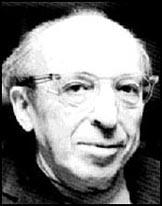Aaron Copland

Aaron Copland was born in New York City on 14th November, 1900. During his childhood, Copland and his family lived above his parents' Brooklyn shop, H.M. Copland's, at 628 Washington Avenue.
His father, Harris Morris Copland, had no musical interest at all but his mother, Sarah Mittenthal Copland, sang and played the piano, and arranged for Aaron to have music lessons.
After attending a concert by composer-pianist Ignacy Jan Paderewski in 1915, he decided to become a composer. Copland took lessons in harmony, theory, and composition from Rubin Goldmark.
Copland was very interested in politics and welcomed the Russian Revolution. This brought him into conflict with his father, who was a loyal supporter of the Democratic Party. Despite his father's objections, Copland became close friends with active members of the Socialist Party of America.
In 1920 Copland moved to Paris where he studied under Nadia Boulanger at the American Academy at Fontainebleau. He had initial doubts about working with Boulanger: "No one to my knowledge had ever before thought of studying with a woman." He soon realised that she was an outstanding teacher and stayed with her until 1924.
On his return to New York City he rented a studio apartment on the Upper West Side. He received two Guggenheim Fellowships and survived on some part-time teaching. During this period he wrote Music for the Theater (1925), Piano Concerto (1926), Piano Variations (1930) and El Salón México (1936). Copland formed the Commando Unit, which included Roger Sessions, Roy Harris, Virgil Thomson, and Walter Piston.
Copland remain active in left-wing groups and asserted the importance of mass singing as a vehicle for communicating the "day-to-day struggle of the proletariat" as part of the development of working-class movements. In articles published in the New Masses, Copland argued that "American workers needed a music appropriate to their own struggles".
In the 1930s Copland became involved in the Group Theatre that had been formed in New York City by Harold Clurman, Cheryl Crawford and Lee Strasberg. The Group was a pioneering attempt to create a theatre collective, a company of players trained in a unified style and dedicated to presenting contemporary plays. His major contribution was writing the music for Quiet City, a play written by Irwin Shaw.
As Barbara L. Tischler has pointed out: "During the following decade, Copland's explicitly political activity was transformed into an effort to incorporate American folk and popular music along with regional settings into many of his concert and stage works." His ballet scores for Billy the Kid (1938), Rodeo (1942) and Appalachian Spring (1944), all reflect the composer's interest in portraying regional history in music. His left-wing politics was highlighted in his composition, Fanfare for the Common Man (1942).
Copland was a great admirer of Abraham Lincoln and Lincoln Portrait was written as part of the Second World War patriotic war effort. The work includes the reading of excerpts of Abraham Lincoln's great speeches, including the Gettysburg Address. The first performance was by the Cincinnati Symphony Orchestra on 14th May 1942.
Copland's growing reputation as a composer resulted in him being commissioned to write the music for several films including The City (1939), Of Mice and Men (1940), Our Town (1940), The North Star (1943), The Cummington Story (1945), The Heiress (1949) and The Red Pony (1949).
Copland remained interested in politics and in the 1948 Presidential Election he supported Henry Wallace and the Progressive Party. However, he was a strong critic of Joseph Stalin and his government. He decried the lack of artistic freedom in the Soviet Union and argued that censorship deprived artists of "the immemorial right of the artist to be wrong".
In June, 1950, three former FBI agents and a right-wing television producer, Vincent Harnett, published Red Channels, a pamphlet listing the names of 151 writers, directors and performers who they claimed had been members of subversive organizations before the Second World War but had not so far been blacklisted. The names had been compiled from FBI files and a detailed analysis of the Daily Worker, a newspaper published by the American Communist Party. The list included the name of Aaron Copland.
A free copy of Red Channels was sent to those involved in employing people in the entertainment industry. All those people named in the pamphlet were blacklisted until they appeared in front of the House of Un-American Activities Committee (HUAC) and convinced its members they had completely renounced their radical past. This ended Copland's commissions from Hollywood and so he concentrated on other work such as an opera, The Tender Land (1954), Piano Fantasy (1957), Connotations for Orchestra (1962) and Inscape (1967).
Aaron Copland, whose autobiography, Composer from Brooklyn, was published in 1984, died in North Tarrytown, on 2nd December, 1990.
